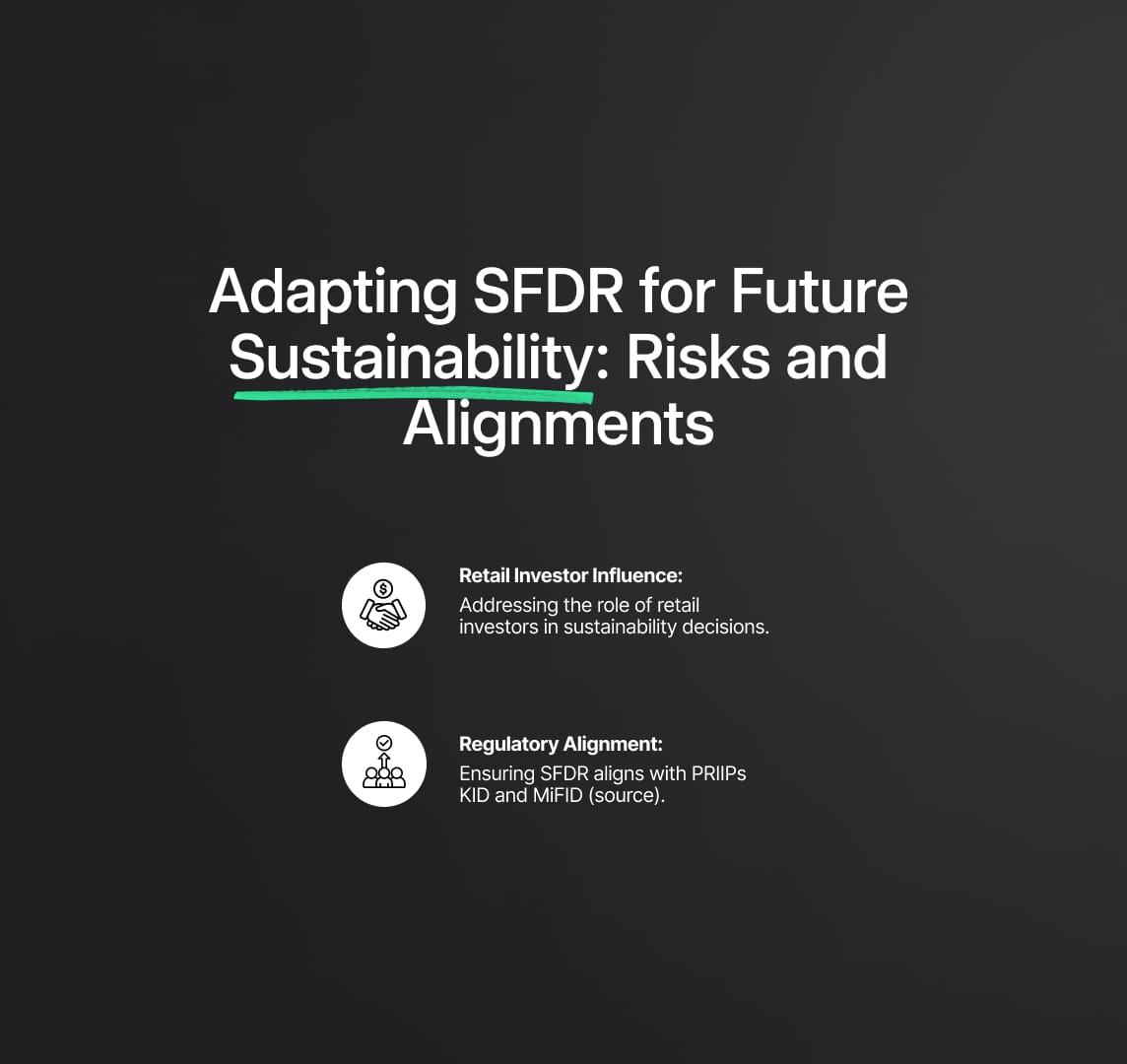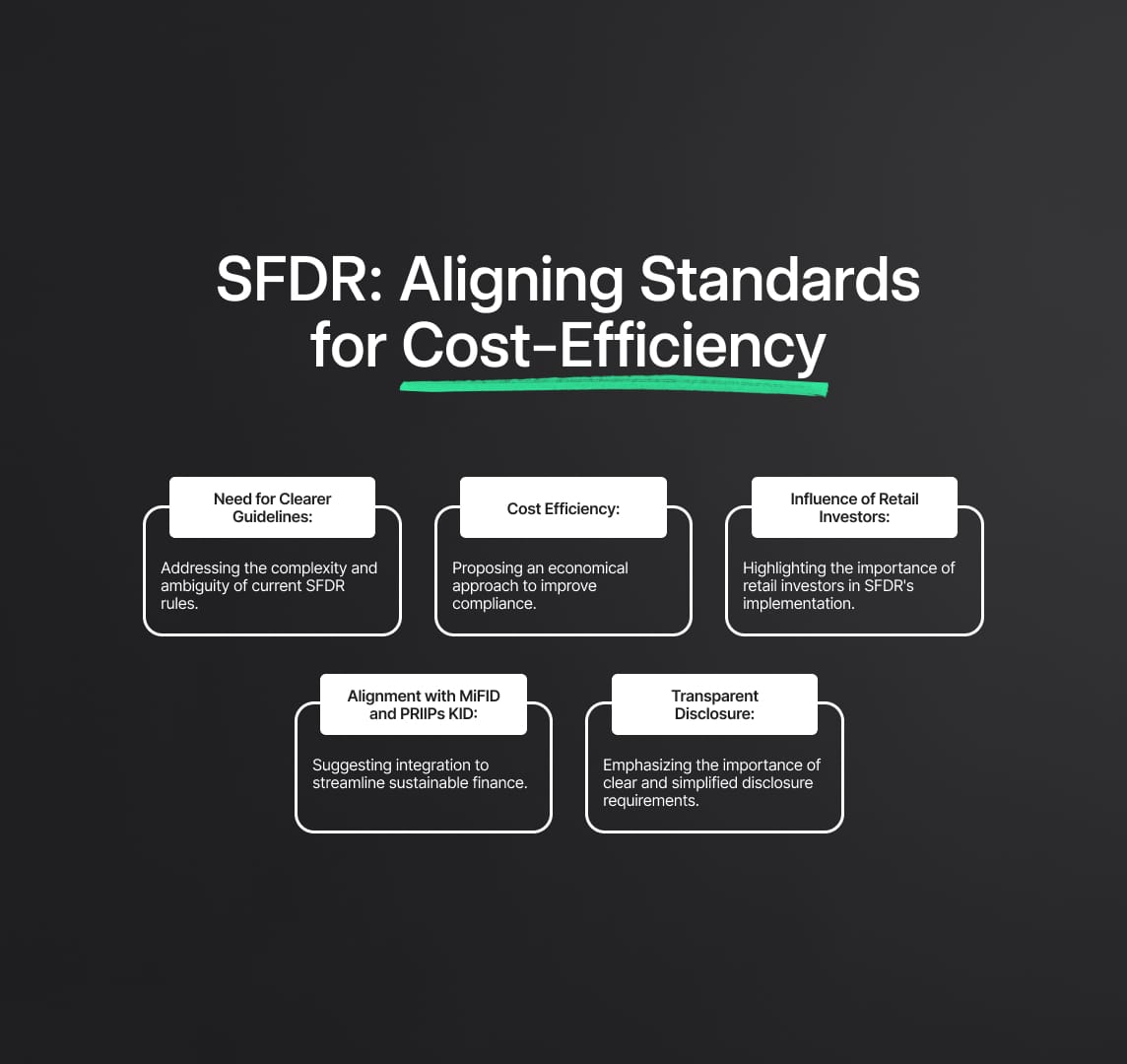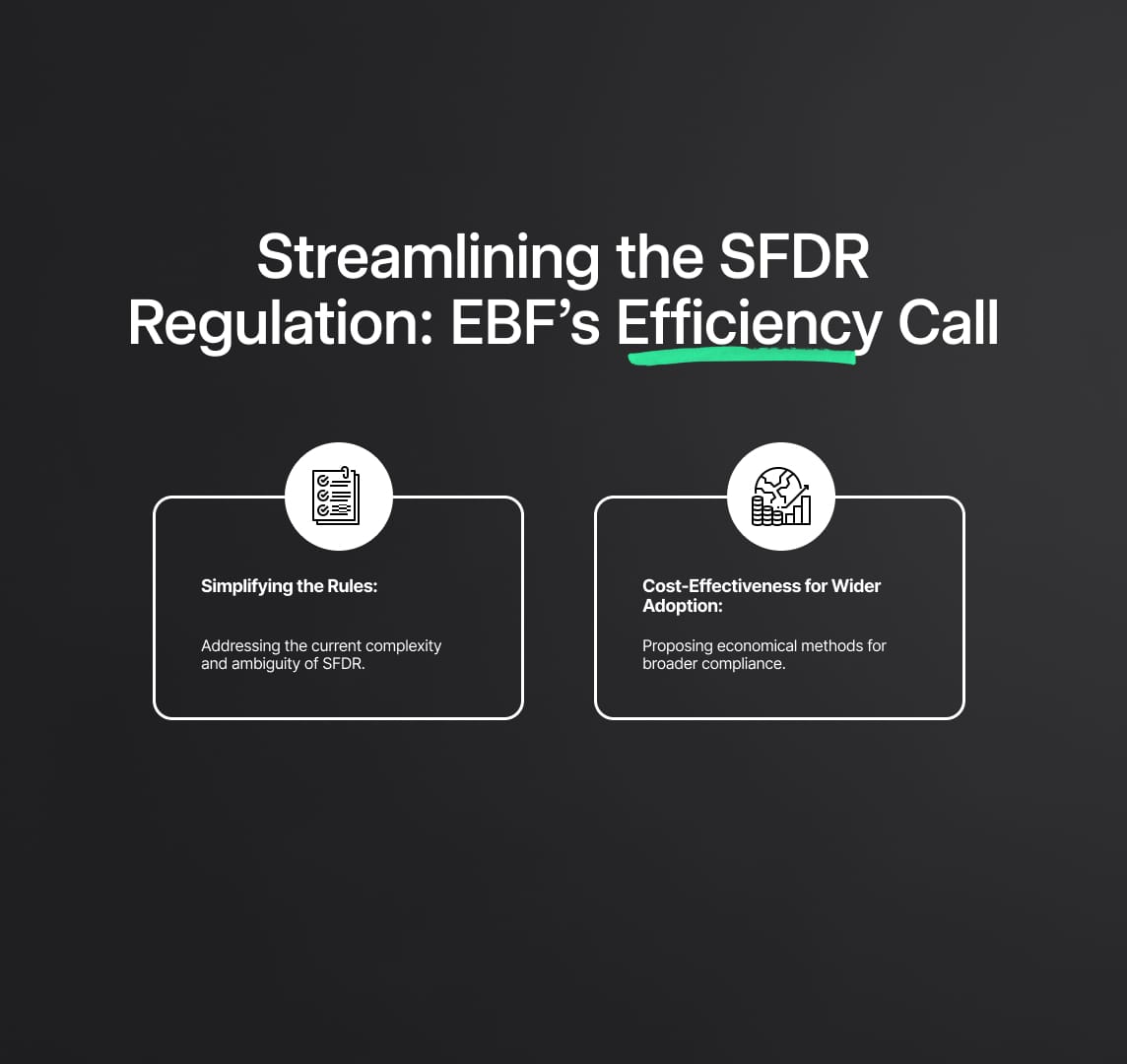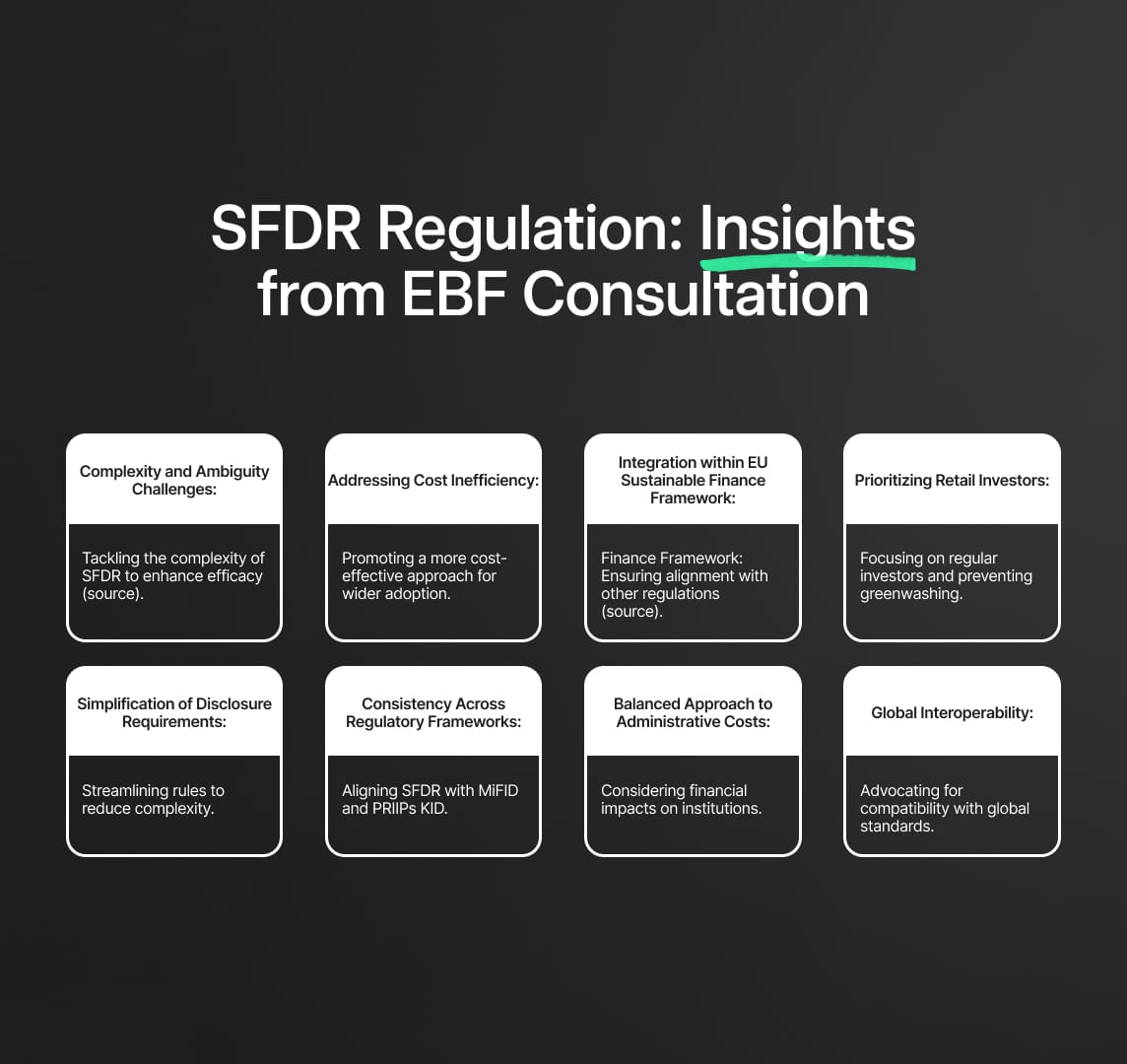Sustainable Finance Disclosure Regulation (SFDR)
The European Banking Federation (EBF) highlights the need for clearer SFDR guidelines, emphasizing cost efficiency and the growing influence of retail investors. Their response advocates for aligning the SFDR with MiFID and PRIIPs KID, aiming to streamline sustainable finance in the EU.

SFDR Regulation: EBF Consultation
A thorough examination of the Sustainable Finance Disclosure Regulation (SFDR), a key component of the European Union's sustainable finance policy, was recently conducted by the European Banking Federation (EBF). The EBF identified important problems within the current SFDR framework that require attention and improvement during their thorough study.
- Complexity and Ambiguity Challenges:
- EBF voiced concerns about the SFDR rules' complexity and ambiguity.
- Complexity affects the overall efficacy of the legislation and makes it more difficult for institutions to comply.
- EBF emphasized the need for simpler, clearer standards to make compliance easier and improve stakeholder comprehension.
- Addressing Cost Inefficiency:
- The current SFDR structure's cost inefficiencies was brought to EBF's attention.
- High compliance costs have the potential to deter smaller institutions and prevent sustainable finance from being adopted more widely.
- EBF suggested a more economical strategy to promote increased involvement without undermining the goals of the legislation.
- Integration within EU Sustainable Finance Framework:
- EBF stressed how important it is to synchronize SFDR with other elements of the EU Sustainable Finance Framework.
- Processes would be streamlined and the impact of these regulations in encouraging sustainable practices in the financial sector would be increased by a unified and integrated approach across regulatory frameworks.
- Prioritizing Retail Investors:
- EBF emphasized how important it is for the SFDR assessment to take regular investors into account.
- Suggested a classification system to help discover and group sustainable items on the market, based on SFDR principles.
- Attempting to stop greenwashing tactics and arm investors with knowledge.
- Simplification of Disclosure Requirements:
- EBF promoted streamlining disclosure requirements in order to reduce the possibility of greenwashing.
- Less complicated disclosure rules support a unified approach to sustainable finance by being in line with global financial market efforts.
- Consistency Across Regulatory Frameworks:
- The Markets in Financial Instruments Directive (MiFID), the Packaged Retail and Insurance-based Investment Products (PRIIPs) Key Information Document (KID), and the SFDR were required to be consistent, according to the EBF.
- Suggested streamlining and streamlining the entity-level disclosure process for sustainability in order to improve transparency and lessen administrative load.
- Balanced Approach to Administrative Costs:
- EBF emphasized that when implementing SFDR, administrative expenditures must be taken into account.
- Argued for a reasonable strategy that recognized the financial impact on institutions while guaranteeing the regulation's continued efficacy.
- Global Interoperability:
- EBF pushed for SFDR to be compatible with comparable laws in other countries.
- Working to create an international standard for sustainable financing methods.
Beyond simple identification, the EBF's response provides strategic recommendations for a more sophisticated and user-friendly SFDR. Their observations add to the continuing discussion on improving frameworks for sustainable finance to create a more stable and accountable financial environment.

Streamlining the SFDR Regulation: The EBF's Call for Clarity and Efficiency
The Sustainable Finance Disclosure Regulation (SFDR) has undergone a thorough examination by the European Banking Federation (EBF), which has identified numerous important areas for improvement. The way the European Union approaches sustainable finance in the future will be greatly influenced by this answer.
- Simplifying the rules: The EBF is primarily concerned about the SFDR rules' present uncertainty and complexity. They contend that the intricacy of the regulation lessens its impact and makes compliance more difficult. The EBF suggests a more simplified strategy, arguing that more precise standards would make compliance easier and better understood, increasing the SFDR's overall efficacy in advancing sustainable financing.
- Cost-Effectiveness for Wider Adoption: The EBF also brought up the important topic of the inefficiency of the costs related to SFDR compliance. Smaller financial institutions may find this especially difficult because of the costs involved, which could prevent them from adopting sustainable finance practices more widely. The European Bank for Reconstruction (EBF) proposes a more economical method to compliance that would promote involvement from a larger spectrum of institutions while upholding the goals of the law.

Adapting SFDR for Future Sustainability: Risks and Alignments
The EBF's observations go beyond compliance matters to discuss the SFDR's wider effects on the financial industry, particularly in light of retail investors' growing influence.

- Retail Investor Influence: According to the EBF, there has been a change in the way that retail investors are influencing sustainability decisions. Although democratization has advantages, there are drawbacks as well. The EBF issues a warning, stating that retail investors might not have the information and comprehension needed to choose sustainable products wisely. Financial losses and less-than-ideal investing decisions could result from this. They advocate for increased educational initiatives and more open product information to enable average investors to make wiser choices.
- Regulatory Alignment: In addition, the EBF emphasizes how crucial it is that the SFDR be consistent with and in line with other regulatory frameworks, such as the Packaged Retail and Insurance-based Investment Products (PRIIPs) Key Information Document (KID) and the Markets in Financial Instruments Directive (MiFID). They suggest streamlining disclosure requirements, which would lessen the possibility of greenwashing and increase investors' understanding of sustainable investing possibilities. By reducing administrative costs and streamlining procedures, this alignment would increase the effectiveness and accessibility of sustainable finance.

Read More

Reduce your
compliance risks


